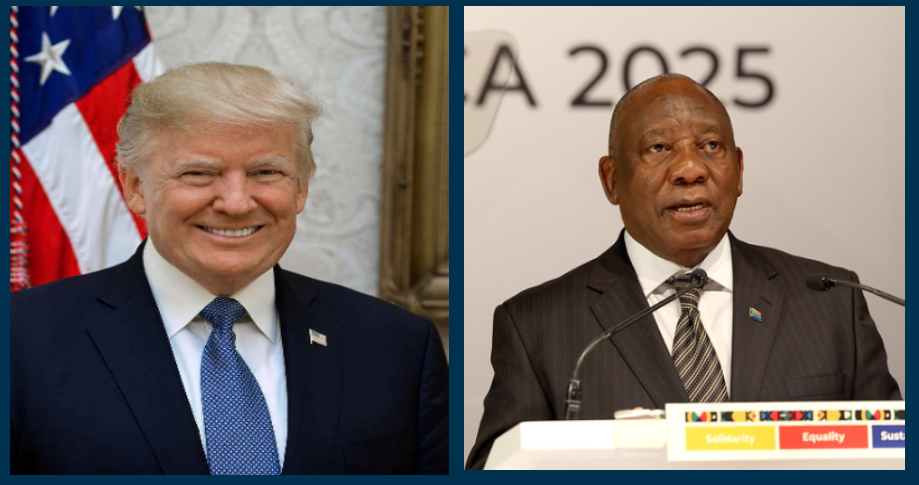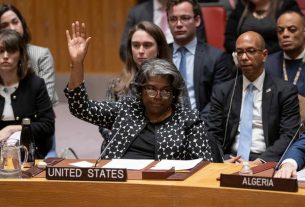U.S.–South Africa relations have sharply deteriorated ahead of President Cyril Ramaphosa’s planned visit to Washington on May 21, 2025. The Trump administration has expressed deep concerns over South Africa’s domestic and foreign policies, including controversial land reform efforts, perceived anti-American rhetoric, and deepening ties with Iran, Russia, and China. The upcoming visit is framed as a last-ditch attempt to prevent punitive U.S. measures, such as sanctions or trade restrictions. However, the prospects for a breakthrough appear slim, given the breadth of U.S. grievances and strong opposition within the Trump administration.
Key Takeaways
- The bilateral relationship between South Africa and the United States is in severe decline. The upcoming visit to Washington by President Ramaphosa is seen as a “last-ditch effort”.
- The Trump administration holds a range of grievances against South Africa, driven by key allies and constituencies. These include claims of violence against white landowners, hostility toward the U.S. and its allies, and discriminatory economic policies. Stephen Miller has spotlighted alleged mistreatment of Afrikaners, while figures like Elon Musk have raised concerns over Black Economic Empowerment laws. Secretary of State Marco Rubio, meanwhile, accuses South Africa of advancing an anti-American agenda through alignment with Russia, China, and Iran, support for BRICS, and efforts to weaken the dollar.
- President Ramaphosa faces significant challenges in achieving a positive outcome, with concessions appearing nearly impossible due to domestic constraints and the fundamental nature of the issue. While Pretoria may believe misunderstandings can be explained away, the issues at hand represent core tenets of ANC policy.
The Trump administration’s accusations have intensified following President Trump’s claims of a “genocide” targeting white farmers in South Africa, which President Ramaphosa’s administration strongly denies. Trump has invoked these claims to justify accepting Afrikaner refugees and cutting foreign aid to South Africa via an Executive Order. The order criticizes South Africa’s 2024 Expropriation Act, which allows land seizure without compensation, alleging it unfairly targets white landowners. Further tensions arose when U.S. Secretary of State Marco Rubio snubbed the G20 summit in Johannesburg, criticizing South Africa’s policies and President Ramaphosa’s stance at the International Court of Justice, where South Africa accused Israel of genocide against Palestinians.(Time)
Despite the tensions, Ramaphosa visited the White House in May 2025 seeking to restore ties and secure a favorable trade deal. The situation has been inflamed by Elon Musk, head of the Department of Government Efficiency, who has publicly criticized South African policies and whose AI bot, Grok, circulated controversial content about white genocide. Ramaphosa hopes to mend relations and emphasize South Africa’s distinct identity amid these ongoing diplomatic disputes.(Time)
In an effort to appeal to President Trump’s known passion for golf, President Ramaphosa plans to bring renowned golfers Ernie Els and Retief Goosen to a meeting with U.S. President Donald Trump in the Oval Office. The gesture is intended to avoid the kind of public reprimands seen in past diplomatic interactions. Tensions have escalated due to Trump’s claims of a white “genocide” in South Africa and subsequent U.S. actions, including cutting aid and granting refugee status to white South Africans. There is significant concern in South Africa over the future of the African Growth and Opportunity Act (AGOA), which provides tariff-free U.S. access for South African exports. The act expires in September, and its renewal is uncertain. Billionaire Johann Rupert, a longtime acquaintance of Trump, played a key role in facilitating the meeting through golf links, having previously lobbied Trump with Els. Discussions may also touch on offering Elon Musk a deal to expand his Starlink service in South Africa, although affirmative action laws present complications. Ramaphosa’s office has not commented on the finalized delegation or negotiations with Musk.(The Guardian)
The risks of a break with Washington are high for South Africa, the continent’s biggest economy and traditionally a political and diplomatic leader as well. The United States is South Africa’s second-largest export market, just behind China, with two-way trade topping $20 billion a year. Trade is made easier by the Africa Growth and Opportunity Act (AGOA), put in place by President George W. Bush and allowing duty-free access to the U.S. by African countries for a wide list of goods. It is due to expire in September and there are fears here that Pretoria may find itself dropped from the treaty.(The Washington Times)
Despite Pretoria’s desire to continue trading with the U.S., the strained relationship poses significant challenges. President Cyril Ramaphosa has expressed the country’s intention to continue trading with the United States under the African Growth and Opportunity Act (AGOA) despite the ongoing row with the country. However, the deteriorating relationship and the uncertainty surrounding AGOA’s renewal add complexity to this objective.(The Mail & Guardian)
In conclusion, the upcoming visit by President Ramaphosa to Washington is a critical juncture in U.S.–South Africa relations. While efforts to mend ties are underway, the deep-rooted issues and opposing stances on key policies present significant obstacles to a meaningful resolution. The outcome of this visit could have lasting implications for bilateral relations and regional dynamics.
President-Donald-J.-Trump-Picryl-by-White-House-Media-Team-and-President-Cyril-Ramaphosa-Flickr-by-GovernmentZA



